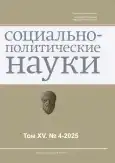The presence of deputies of the State Duma on social networks (using Telegram as an example)
- Authors: Rogachev S.V.1, Dykhanova D.Y.2
-
Affiliations:
- Federal Center of Theoretical and Applied Sociology of the Russian Academy of Sciences
- Russian Academy of National Economy and Public Administration under the President of the Russian Federation
- Issue: Vol 15, No 4 (2025)
- Pages: 133-145
- Section: Political Institutions, Processes and Technologies
- URL: https://journal-vniispk.ru/2223-0092/article/view/348442
- DOI: https://doi.org/10.33693/2223-0092-2025-15-4-133-145
- EDN: https://elibrary.ru/YJCWKF
- ID: 348442
Cite item
Abstract
In the modern conditions of the information society development, social networks are becoming the most important tool for political figures, in particular deputies of the State Duma. The use of technology allows influencing the formation of public opinion, broadcasting views and political ideas to the masses, as well as gaining the trust of citizens, retaining the attention of voters and like-minded people. Social networks, as a new form of communication, provide unique opportunities for a parliamentarian to interact with his audience at any time of the day and from anywhere in the world. They allow deputies not only to receive feedback from voters and subscribers, but also to attract the attention of other users through citations generated through mentions of a particular deputy in the media or a group, reposts, that is, forwarding a political figure’s post to communities or personal messages, using the unique capabilities of a particular social network and, of course, broadcasting the legislator’s political position through modern media technologies. This article examines the process of interaction between deputies of the State Duma of the VIII convocation and civil society on social media communication platforms (using Telegram as an example).
Keywords
Full Text
##article.viewOnOriginalSite##About the authors
Sergey V. Rogachev
Federal Center of Theoretical and Applied Sociology of the Russian Academy of Sciences
Author for correspondence.
Email: rogachev33@mail.ru
ORCID iD: 0000-0002-3991-813X
SPIN-code: 3467-1751
Dr. Sci. (Econ.), Professor, chief researcher
Russian Federation, MoscowDarya Y. Dykhanova
Russian Academy of National Economy and Public Administration under the President of the Russian Federation
Email: dyhanovadaria@mail.ru
master’s degree of Political Sciences
Russian Federation, MoscowReferences
- Boyd D.M., Ellison N.B. Social network sites: Definition, history, and scholarship. Journal of Computer-Mediated Communication. 2007. Vol. 13. Issue 1. Pp. 210–230.
- Vasilenko N.A. The phenomenon of social networks: History, types, features. In: Actual problems of socio-cultural activity in the modern space of the Moscow metropolis. Collection of scientific works. E.I. Medved, G.V. Ganshina (eds.). Moscow: MSPU, 2021. Pp. 146–152.
- Gubanov D.A., Novikov D.A., Chkhartishvili A.G. Social networks: Models of information influence, management and confrontation. Moscow: Publishing House of Physical and Mathematical Literature, 2010. P. 4.
- Dykhanova D.Yu. Telegram-journalism: How the platform affects the transformation of the media. In: Journalism and media communications in the digital environment. Collection of scientific articles of II International student scientific and practical conf. (Moscow, March 23, 2023). D.V. Nerenz (ed.). Moscow: RSUH, 2023. Pp. 61.
- Makarov A.A. On the question of typologies of social networks and their users. Theory and Practice of Modern Science. 2021. No. 10 (76). (In Rus.)
- Merkusheva A.S., Tuzova E.A., Grishanin N.V. Digital technologies in shaping the image of the political elite of St. Petersburg. Bulletin of the Russian University of Friendship on-rod. Series: State and Municipal Administration. 2024. Vol. 11. No. 3. Pp. 312–319. (In Rus.)
- Pashkova K.V. Social networks as a modern means of mass communications. In: Science. Society. Man. Collection of scientific works based on materials from II MNPK (Smolensk, May 15, 2019). Smolensk: Naukosphere, 2019. Pp. 16–19.
- Pustovalov A.V. Information activities in social networks. Textbook. Perm: Perm State National Research University, 2024. Pp. 17–25.
- Rassokho D.L. Social networks as a tool for forming and promoting the political image of the head of the region. Cognitive Sciences in the Information Society. 2022. Vol. 2. No. 2. P. 4. (In Rus.)
- Ilyicheva L.E., Parshina E.V., Lapin A.V., Ilyicheva M.V. Interaction between the state and civil society: Analysis of assessments of the effectiveness of social partnership policies based on surveys of Muscovites. Monitoring Public Opinion: Economic and Social Changes. 2024. No. 4. P. 318. (In Rus.)
Supplementary files








